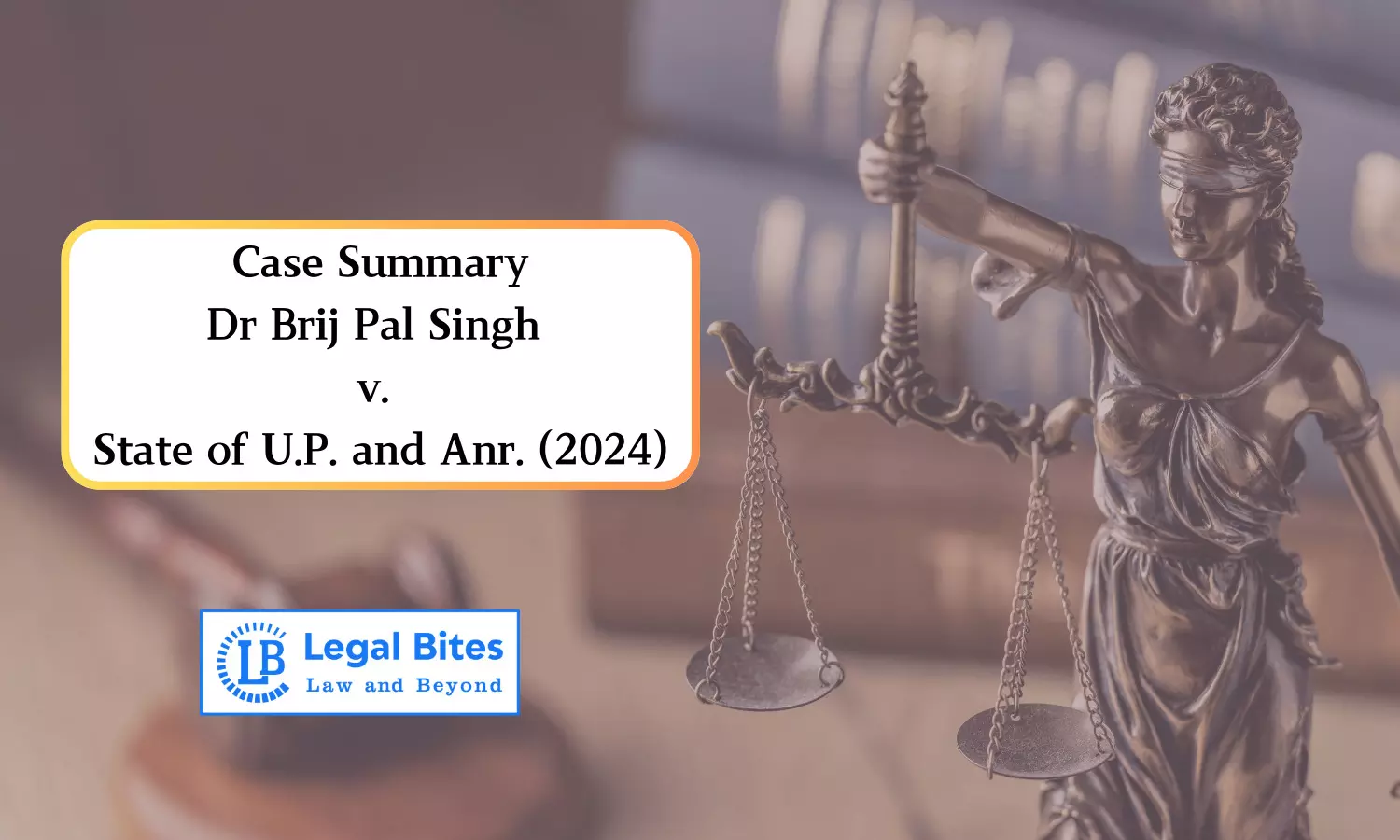Case Summary: Dr Brij Pal Singh v. State of U.P. and Anr. (2024) | Allahabad HC: Police Investigation Prohibited Under PCPNDT Act
Allahabad High Court ruled that only the appropriate authority, not the police, can investigate and take cognizance of cases under the PCPNDT Act

This case underscores the importance of adhering to the procedural requirements of the Pre-conception and Pre-natal Diagnostic Techniques (Prohibition of Sex Selection) Act while also emphasizing the need for strict enforcement to prevent illegal sex determination practices. Court: High Court of Judicature at AllahabadCase Title: Dr Brij Pal Singh v. State of Uttar Pradesh and AnotherCitation: 2024: AHC: 159207Judge: Justice Anish Kumar GuptaDate of Judgment: September 30th, 2024Facts of...
This case underscores the importance of adhering to the procedural requirements of the Pre-conception and Pre-natal Diagnostic Techniques (Prohibition of Sex Selection) Act while also emphasizing the need for strict enforcement to prevent illegal sex determination practices.
Court: High Court of Judicature at Allahabad
Case Title: Dr Brij Pal Singh v. State of Uttar Pradesh and Another
Citation: 2024: AHC: 159207
Judge: Justice Anish Kumar Gupta
Date of Judgment: September 30th, 2024
Facts of the Case:
On 14th March 2017, Tehsildar Khurja from District Bulandshahar submitted a report to Kotwali Nagar police station, stating that the District Magistrate had received information from a secret informer. The informer alleged that Sobha Ram Hospital was conducting illegal sex determination tests with the intent to prevent the birth of female children. In response, the District Appropriate Authority, Bulandshahar, authorized the Tehsildar to conduct an operation to catch those responsible.
To carry out the operation, a Special Action Team was formed, led by Sub-Inspector Subhash Singh from P.S. Kotwali Nagar and the Tehsildar. The team included two constables, lady constable Preeti, and her decoy husband, Sanjay Kaushik, who posed as customers seeking a sex determination test. The Tehsildar provided Preeti with Rs. 11,000 to use as bait.
The team assembled at Kaala Aam crossing, and the decoy couple proceeded to Sobha Ram Hospital. Sanjay soon returned and reported that two individuals, Kallan and Sanjeev, were standing at the hospital gate. After Sanjay explained their purpose, the men assured him they could arrange the illegal test with the doctor. A deal was made, and Kallan and Sanjeev went inside to negotiate with the doctor.
After the FIR was registered, the police investigated the case and submitted a charge sheet on 6th August 2017. Subsequently, the Additional Chief Judicial Magistrate of Bulandshahar took cognizance of the matter.
Issues:
- Whether a magistrate can take cognizance of an offence under the PCPNDT Act based on a charge sheet following an investigation.
- Whether the police had the authority to investigate the matter under the PCPNDT Act
Legal Provisions:
- Section 28 of the PCPNDT Act: This section restricts the filing of complaints and initiation of proceedings under the Act to the appropriate authority or an authorized officer.
- Section 17 of the PCPNDT Act: Defines the appropriate authority and their powers, including the ability to delegate responsibilities to subordinate officers.
- Section 482 CrPC: Provides the High Court with inherent powers to quash proceedings where there is a legal infirmity.
Arguments by the Applicant:
Dr. Brij Pal Singh contended that the proceedings were invalid as the FIR was filed by a Tehsildar, who was not the "appropriate authority" under Section 28 of the PCPNDT Act. The Act mandates that only an appropriate authority or an officer authorized by the Central or State Government may lodge complaints or initiate legal proceedings under the Act. Additionally, it was argued that the actions of the authorities violated the procedural safeguards prescribed in the Act, particularly those related to search and seizure.
Arguments by the State:
The State, represented by learned counsel Sri Pankaj Srivastava, argued that the FIR and the subsequent investigation were valid. The Tehsildar had been authorized by the District Magistrate, who is the appropriate authority, to carry out the necessary actions. Counsel further contended that the proceedings were consistent with the provisions of the PCPNDT Act, which grants broad powers to ensure compliance with its provisions, including through the use of authorized officers for investigation and enforcement.
Decision of the Court
In this case, the Allahabad High Court found that there was no evidence on record to suggest that the appropriate authority had recorded any satisfaction regarding the commission of an offence by the applicant. The proceedings were based solely on the actions of the Tehsildar, who was allegedly authorized by the appropriate authority, though no valid authorization was provided.
The Allahabad High Court quashed the police investigation and held that only the authorities designated under the PCPNDT Act are empowered to conduct investigations, searches, and seizures related to offences under the Act. The court noted that the PCPNDT Act is a special statute that overrides general powers provided to the police under the CrPC.
The Additional Chief Judicial Magistrate, Bulandshahar, took cognizance of the case on 02.01.2018 under Sections 315 and 511 of the IPC, as well as under the provisions of the PCPNDT Act. However, the court ruled that this was an impermissible exercise, as the Magistrate did not have the authority to take cognizance under the PCPNDT Act. As a result, the Allahabad High Court quashed the cognizance order, the FIR, the charge sheet, and the entire proceedings, allowing the applicant's petition.
Click Here to Read the Full Judgment

Apurva Neel
I am a Research Associate and Editor at Legal Bites with an LL.M. specialization in Corporate and Commercial Laws from Amity University, Mumbai. I have put my best efforts into presenting socio-legal aspects of society through various seminars, conferences etc. I keep refining content as I am an ardent writer, and palpably law has got multi-dimensional aspect, so I passionately try to explore ahead.
